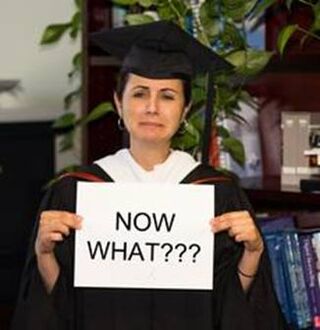Intelligence
How Are You Smart?
Multiple intelligences, diverse learning styles, motivation, and success.
Posted September 30, 2013 Reviewed by Jessica Schrader
Luskin's Learning Psychology Series—No. 9.
How Are You Smart?
The Media Psychology Effect on Learning Encompasses Multiple Intelligences, Diverse Learning Styles, Personal Identity, Willing Motivation and the Creation of Pathways to Success.
By Dr. Bernard Luskin
Before 1967 and Harvard professor Howard Gardner’s study, Project Zero, the public largely accepted the idea that one's intelligence could be easily measured by a test resulting in an Intelligence quotient number (IQ). The IQ test, developed at the beginning of the 20th century by French psychologist Alfred Binet, became the standard means of assessment to determine how smart you were. A high IQ score meant that you were smart. A low score … well, you understand the implication. A high IQ number opened doors to many opportunities in life and a low IQ number frequently limited one’s opportunities.
Project Zero led the way in popularizing the concept of multiple intelligences (MI) and the premise that individuals may have an fields of specific intelligence with the potential for a high degree of development, allowing one to excel in a particular subject field but not necessarily to that same high degree in another field (Gardner, 1989). Gardner’s project postulated that the verbal-linguistic and logical-mathematical “general” intelligence, normally measured by IQ tests, might not be the best measure of a person’s potential. Today, the concept of multiple intelligences is widely acknowledged. However, traditional methods of assessing and quantifying general intelligence and aptitude by assigning a number score continue to influence our decision-making systems.
To be sure, IQ testing may be reasonably accurate at predicting how well you can do on certain school subjects. However, a score number that quantifies verbal and mathematic skill may not be the best assessment tool to gauge your artistic, environmental, or emotional abilities. Standard IQ tests do not accurately measure your ability to compose a symphony, win a political campaign, conceive an architectural design, or manage difficult situations and difficult people.
The acceptance of multiple intelligence reframes the question from “How smart are you?” to “How are you smart?”
The emergence multiple intelligence theories, the acceptance of diversity in learning, alternative learning styles, and the possibility of different measures of success are challenges yet to be resolved in terms of accuracy of result when used as the metrics and analytics in identifying, defining, and measuring student success. The numbers can be statistically accurate, but the question of accuracy of measurement is interesting to ponder.
The acceptance of multiple intelligences expands our view of the nature of intelligence.
Multiple intelligences provide an effective common-sense approach to what intelligence really means. Today there is wide agreement that the achievements of iconic figures such as Mozart, Henry Ford, Gandhi, Einstein, or Churchill display examples of different types of intelligence. It is increasingly acknowledged that we each have different combinations of ways in which to be intelligent (Gardner, 1993). The emerging view is that success comes from motivation and refining and utilizing combinations of specific intelligences across a lifetime. Shouldn't this type of critical thinking also be considered in evolving definitions of student success or pathways to success in careers or in life? At a minimum, this view poses an interesting question.
Multiple intelligence in a nutshell
All human beings may possess a unique blend of any number of specific intelligences. Isaac Asimov told me at dinner one evening that he felt that there could be a hundred types of intelligence. Gardner has argued that some types of intelligence are associated with the arts; others may be identified as personal intelligences, and some as emotional or environmental intelligences.
Examples of some of the intelligences include: Linguistic intelligence, Logical-mathematical intelligence, musical intelligence, bodily-kinesthetic intelligence, visual-spatial intelligence, interpersonal intelligence, emotional intelligence, environmental intelligence, and there are more.
Diversity of Learning Styles
Different intelligences, life requirements, and environments also support the idea of diverse learning styles. Therefore, the acceptance of multiple intelligences presents a legitimate challenge to established traditional educational models. If you accept the idea that a person can combine a unique array of specific intelligences, or abilities, you would also need to accept that there is a place for a wide variety of learning approaches to enable each individual to realize his or her potential. In my view, diversity in learning styles requires taking into account the specialness of each individual.
It can be argued that MI theory now has growing acceptance because it mixes well with the current self-esteem movement. If Ann doesn’t do very well in algebra but can play the piano beautifully, she is as intelligent as Mary who gets straight A's in math. The theory may seem to support the egalitarian view that no one is superior to anyone else in terms of being smarter…just different. Implementation of the theory may require much time and be expensive. For instance, a typical project to teach about the ocean might ask the learner to write about sea life (linguistic intelligence), draw a sea creature (spatial intelligence), role play a sea creature (bodily-kinesthetic intelligence), use a Venn diagram to compare and contrast ships (logical intelligence), produce sounds by tapping glasses containing different amounts of water (musical), or work with a group to design a ship (interpersonal intelligence). One of the difficulties with accepting the theory of multiple intelligences is that each type of intelligence may be difficult to assess one way or the other and some specific types of intelligence, such as experiential, existential, intuitive or emotional are hard to measure.
To me, MI theory makes sense. Multiple intelligences have been widely accepted and little by little, formal education is evolving to acceptance. However, most of the metrics remain linier and quantitative. Again, it seems important to acknowledge that willingness to learn coupled with motivation are also powerful tools for success.
In an interview with Stedman Graham, a leading author and figure in promoting pathways to success, I realized that Stedman is one who has not allowed the challenges of his past circumstances to dictate his future. His position in our conversation was that one should “… live out of your imagination and not your history.” He told me about a Gallup survey revealing that about 25% of Americans feel they are victims of circumstance. The California Dream Act, recent legislation taking center stage as a pathway to education for immigrants, is an example of an effort to address this situation. Graham’s primary theme is that you can make success happen by finding your motivation and willingly linking it to your specific intelligence. He is eloquent when talking about the importance of using the formidable tool set you are born with to help you achieve what you desire.
Many key theorists are also supportive of Graham's assertion that reinforces the theme that motivation and the search for self-actualization offer the pathway to success in careers and in life. You can learn much from the foundational works of Abraham Maslow, Edward De Bono, Howard Gardner, Robert and Judith Wright, Carl Rogers, Stedman Graham, and others who have taught me by helping me to understand that positive thinking and the will and desire for personal transformation are the essential elements for planning and achieving one's successful future.
Neurolinguistic Programming (NLP), Self-Talk, Positive Psychology, and Your Glass Half Full
Neurolinguistic Programming (NLP) arose out of studies examining how verbal and non-verbal language can affect your nervous system and the way you feel. The theoretical framework was founded by UC Santa Cruz Linguistics Professor, Dr. John Grinder, and Gestalt therapist and student Richard Bandler in the 1970′s at the University of California, Santa Cruz. Its premise is that we can control our nervous system so that our responses and actions, though seemingly “natural responses,” are actually programmed by our behavior and our thinking. We can intentionally program ourselves because we each experience the world subjectively and are able to create our own representations of our own unique experiences. My belief is that self-talk, positive psychology, and a “glass half full” approach is healthy and foundational to enabling those with motivation to achieve success.
Transformational Leadership and Coaching
Dr. Robert (Bob) Wright is CEO of the Wright Graduate University and a leader in articulating the importance of transformational leadership and coaching. He is a primary proponent of positive psychology and Dr. Judith Wright., Chief Academic Officer of the university, has globalized the position that positive thinking can help overcome soft addictions and is a blueprint to achieve personal transformation(Wright, 2013). They are leading proponents of the importance of searching for, "How are you smart?"
What needs to change and what needs to remain the same?
There are many challenges ahead for the application of positive psychology to issues of diversity, multiple intelligences, and social circumstances for the purpose of changing and improving higher education. Today we hear about Massive Online Open Courses (MOOCs) as part of the trend towards access and reduced costs for learning. Others urge reframed definitions of time and money, explaining that “education on demand” via online learning leaves more flexible time for students to earn more money to pay the higher fees and that it opens the door for those at different stages of life and responsibility. In a sense, we have now begun talking about “lifestyle learning.” In various media we hear about Global e-Learning. That “e” is generally meant to refer to electronic, because of the internet and cloud, but also it should also be synonymous with exciting, effective, energetic, emotional, and extended learning, all encased within the growing definitions of eLearning (Luskin, 2002). It should also be extended to the acceptance of alternative learning styles and multiple intelligences that are all factors in today’s discussions.
Media provides a powerful vehicle for learning. Marshall McLuhan appropriately said, “The medium is the massage” (McLuhan, 1985). Diversity in learning is at the center of our 21st-century global changes. We must continue to refine our thinking if we acknowledge the importance of the question, “How are you smart?” Your answer logically leads to the second question that is equally important if we are to make positive progress, and is; “What needs to change and what needs to remain the same?”

Author: Dr. Bernard Luskin is President Emeritus of The Society for Media Psychology and Technology, Division 46 of the American Psychological Association. Bernie Luskin has been CEO of eight colleges and universities, Chairman of the Board of the American Association of Community Colleges and CEO of divisions of Fortune 500 companies, including Philips Interactive Media and Jones Education Networks. He is a licensed Marriage and Family Therapist and School Psychologist. Dr. Luskin is presently Chancellor, Ventura County Community College District. Contact: BernieLuskin@gmail.com.
Contributors: Thanks to Dr. Toni Luskin, and Ms. Andrea Rambo for their help in preparing and posting this post.
References
Bandler, R., Grinder, J. (1979). Frogs Into Princes: Neurolinguistic Programming. San Francisco: Real People Press.
Gardner, H. (1989). Frames of Mind (2 ed.). New York: Basic Books.
Gardner, H. (1993). Creating Minds. New York: Basic Books.
Graham, S. (1997). You Can Make It Happen. New York: Simon & Schuster.
Luskin, B. J. (2002). Casting the Net Over Global Learning (1 ed. Vol. 1). Los Angeles: Griffin.
McLuhan, M. (1985). The Medium Is the Massage (5th ed. ed.). Toronto: Ginko Press Inc.
Wright, J., Wright, B. (2013). Transformed; The Science of Spectacular Living (1st ed. ed.). Nashville: Turner Publishing Company.




